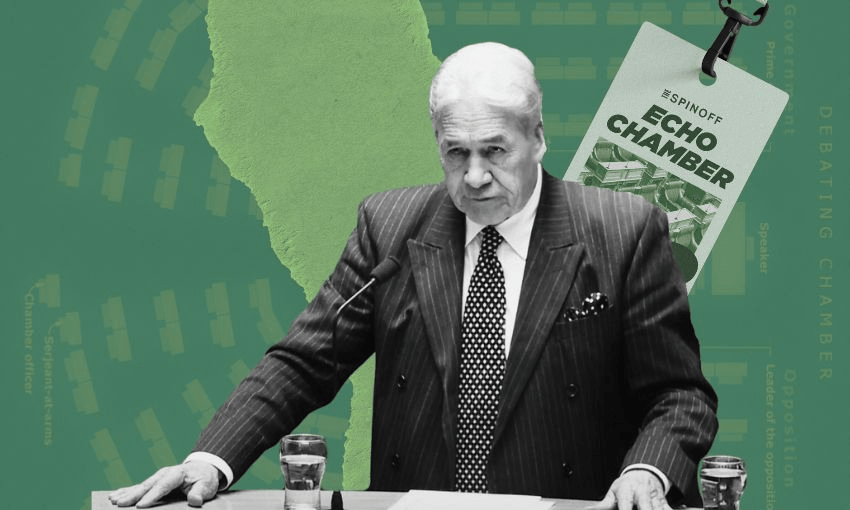He may not be deputy PM any more, but Winston Peters still holds court during question time.
Echo Chamber is The Spinoff’s dispatch from the press gallery, recapping sessions in the House. Columns are written by politics reporter Lyric Waiwiri-Smith and Wellington editor Joel MacManus.
There are two kinds of people in the world: those who wish to fight in the war room, and the gentlemen who know they can’t. Conflict in the Middle East has reached a ceasefire, kind of, but the opposition (and, really, the whole country) this week has been eager to hear whether New Zealand will openly support or condemn the US and Israel for their recent airstrikes in Iran. The trouble is, it’s not quite clear yet if the missile-shaped cloud over parliament will pass, or whether the cowboy who knows this isn’t his first rodeo will ride the bomb to its end. Gee, if only we had one of them doomsday machines.
So, given tensions at home and overseas, Tuesday’s question time was delayed by foreign affairs minister Winston Peters making a statement on the “situation in the Middle East”. He had much to say about preferring diplomacy to “moral outrage” or “kneejerk reaction[s]” or “simplistic moral posturing” or just plain “virtue-signal[ling]”. New Zealand’s interests are in peace and a non-nuclear Iran, Peters told the House – it was a long-winded way of saying we’re not really taking a side at all.
Labour leader Chris Hipkins followed with a more critical take on the situation, that we should prioritise principles over economic interests and allies, though it wasn’t as overtly condemning as the speech from the Greens co-leader Marama Davidson, who implored the House to think of the freedom activists in Iran. But for some reason Peters, in his response, was more concerned over the Greens not being critical enough of “Hamas, Hezbollah, the Houthis” in light of October 7.
“Really? Really, Mr Speaker?” Green co-leader Chlöe Swarbrick interrupted. “Look at my track record!”
“I know your track record, it takes five seconds to examine it,” Peters told her.
When that was all over, Te Pāti Māori’s Tākuta Ferris was first up for oral questions, asking Māori development minister Tama Potaka whether he stood by the government’s track record in upholding te Tiriti (“I look forward to a summary of the robust and strident submissions”), then why the Regulatory Standards Bill didn’’t mention the Treaty (“kōrero in Cabinet remain confidential”), and whether it would undermine the Crown’s Treaty obligations (“this government, through various coalition arrangements, is very committed to upholding Treaty settlements”).
Eventually the bill’s architect David Seymour – who is currently acting prime minister while Christopher Luxon has meetings in Europe – rose to share his view. “Does the minister agree,” Seymour asked, “that if successive governments over the last 185 years had followed the principles in the Regulatory Standards Bill, many of the grievances Māori hold today would never have arisen?”
Potaka didn’t take the bait. “I certainly can acknowledge that there are a lot of disproportionate impacts as a result of government actions over the years,” the minister replied.
Next up was Greens co-leader Marama Davidson, who was keen to know whether the government would condemn the US’s strikes on Iran (as aforementioned, no). As Peters took his time to wax lyrical on rushing to judgment and emerging evidence and letting international courts determine breaches of international law, his NZ First deputy Shane Jones chirped away in his seat. “Fiction!” Jones cried. “Democracy!” A faint voice rose from the opposition benches: “You wouldn’t know what democracy is, Shane.”
Then it was Seymour’s turn to field questions on the cost of living from Hipkins, and the honorary prime minister found there was a perk to this new role: you can kind of just drone on and on and hope no one realises you’re just making a speech. Such was the case when Seymour told the House his school lunch programme now had a 67% approval rating – which he revealed as if it were the greatest honour on Earth – before Brownlee had to tell him to reel it in.
Seymour, who also celebrated his 42nd birthday on Tuesday with two cakes (which may or may not be wasteful spending), was more blunt when Hipkins questioned him on whether the finance minister or IRD could find a single family that had claimed the maximum $250 a fortnight the government had promised in its FamilyBoost scheme. “The fact is, it’s not our job to go hunting for people,” Seymour replied, to roaring laughter from the opposition benches.
The whole palaver ended on a bum note. After Labour’s jobs and incomes spokesperson Ginny Andersen interrogated associate social development minister Penny Simmonds on employment figures and the cancellation of state housing projects, the back and forth summoned one of the government’s most loyal centre backs, Nicola Willis, who called on the speaker to make an example of the opposition for alleging “facts that are not factual”.
Then, when education minister Erica Stanford rose for a cosy supplementary that would’ve let Simmonds show off that the government had increased the number of classrooms built since last year, Brownlee decided he’d heard enough. “I’m absolutely sick of that. We’re calling it quits,” Brownlee declared. “We’re all over.”






